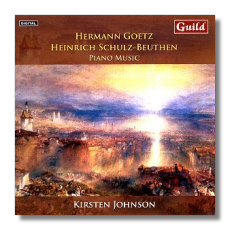
The Internet's Premier Classical Music Source
Related Links
- Latest Reviews
- More Reviews
-
By Composer
-
Collections
DVD & Blu-ray
Books
Concert Reviews
Articles/Interviews
Software
Audio
Search Amazon
Recommended Links
Site News
 CD Review
CD Review
Hermann Goetz / Heinrich Schulz-Beuthen

Piano Works
- Hermann Goetz:
- Lose Blätter Op. 7 (1864-1869 Winterthur)
- 6 Klavierstücke "Genrebilder" Op. 13 – (1870-1876 Zürich)
- Heinrich Schulz-Beuthen: Alhambra Sonata Op. 34 (1878-1882)
Kirsten Johnson, piano
Guild GMCD7282 6m DDD
Hermann Goetz {1840-1876} is one of those ill-fated Romantics who died from tuberculosis at the age of 36. During his day, he was considered a leading composer in German-speaking Europe and his early death only served to enhance his reputation. By the early 20th century his reputation waned, and it is only recently that his works are being regularly revived.
Goetz started his academic career by studying mathematics and physics and only started piano lessons when aged 17. From 1860 he continued his studies at the Stern Conservatoire in Berlin with such teachers as Hans von Bulow. In 1863, he succeeded Brahms' friend Theodore Krichner as organist at the Lutheran Church in Wintherthur. He settled in Zürich in 1867, becoming one of the city's leading musical personalities until his death in 1876.
The two compositions we have on this disc can be considered to be the cream of Goetz's piano output. Lose Blätter {Loose Leaves} Op. 7 and Genrebilder {Genre-Paintings} Op. 13 contain 9 and 6 pieces respectively and both can be compared to Schumann's lyric cycles, although a Mendelssohn echo is not missing either. The music alternates between gentleness and meditation to moments of excitement, joy and natural dynamism, and one wonders what Goetz might have achieved had he lived to old age.
In one of my very recent reviews, I have already touched on the salient points of Schulz-Beuthen's life, so I will not repeat myself. Nonetheless, the Alhambra Sonata is perhaps the most substantial piano work from the ones that have somehow survived. Composed in February 1878 following a visit to the 14th century palace of the Moorish sovereigns in Grenada, it is almost as long as the celebrated 'Hammerklavier' and is in an unusual six movements without any connection between them. I am inclined to describe it as a sort of Fantasy Sonata depicting the various aspects of Moorish life at the height of its architectural and military splendours. Exploiting a vast range of piano textures, it is full of exotic colours and oriental shades worthy of an Albéniz or De Falla.
The American-born pianist Kirsten Johnson dispatches the music with a flamboyance and panache that betrays her young age but certainly not her precocious talent, and she definitely succeeds in capturing all the nuances of the score with disarming ease.
Copyright © 2005, Gerald Fenech




















